- Home
- Kim Newman
Jago
Jago Read online
ALSO BY KIM NEWMAN AND AVAILABLE FROM TITAN BOOKS
Anno Dracula
Anno Dracula: The Bloody Red Baron
Anno Dracula: Dracula Cha Cha Cha
Professor Moriarty: Hound of the D’Urbervilles
COMING SOON
Anno Dracula: Johnny Alucard
JAGO
KIM NEWMAN
TITAN BOOKS
JAGO
Print edition ISBN: 9781781164235
E-book edition ISBN: 9781781164242
Published by Titan Books
A division of Titan Publishing Group Ltd
144 Southwark Street, London SE1 0UP
First edition: March 2013
This is a work of fiction. Names, characters, places, and incidents either are the product of the author’s imagination or are used fictitiously, and any resemblance to actual persons, living or dead, business establishments, events, or locales is entirely coincidental. The publisher does not have any control over and does not assume any responsibility for author or third-party websites or their content.
Kim Newman asserts the moral right to be identified as the author of this work.
Copyright © 1991, 2013 Kim Newman
No part of this publication may be reproduced, stored in a retrieval system, or transmitted, in any form or by any means without the prior written permission of the publisher, nor be otherwise circulated in any form of binding or cover other than that in which it is published and without a similar condition being imposed on the subsequent purchaser.
A CIP catalogue record for this title is available from the British Library.
Did you enjoy this book? We love to hear from our readers.
Please email us at [email protected] or write to us at Reader Feedback at the above address.
To receive advance information, news, competitions, and exclusive offers online, please sign up for the Titan newsletter on our website: www.titanbooks.com
For the people of the village of Alder, in Somerset. A much nicer crowd than the inhabitants of the village of Alder, in the strictly imaginary county of the same name.
‘I’ve heard all this stuff about consensus reality, and you honestly expect me to believe that we’ve just been maintaining this fragile structure of reality based on an agreement between people who can’t agree upon anything?’
LISA TUTTLE
Contents
Prologue
Part I
1
2
3
4
5
6
7
8
9
10
Interlude Seven
Part II
1
2
3
4
5
6
7
8
9
10
11
12
13
14
15
16
Interlude Six
Part III
1
2
3
4
5
6
7
8
9
10
11
12
13
14
Interlude Five
Part IV
1
2
3
4
5
6
7
8
9
10
11
12
13
Interlude Four
Part V
1
2
3
4
5
6
7
8
9
10
11
12
13
Interlude Three
Part VI
1
2
3
4
5
6
7
8
9
10
Interlude Two
Part VII
1
2
3
4
5
6
7
8
9
10
Interlude One
Part VIII
Interlude Zero
Part IX
Afterwards
Acknowledgements
…And Other Stories
Ratting
Great Western
The Man on the Clapham Omnibus
PROLOGUE
Under blood-red clouds, the Reverend Mr Timothy Charles Bannerman touched a lucifer to his sexton’s torch. Flames curled like instantaneous ivy about the pitch-clogged cotton. When Old Jerrold held it up, wind-whipped fire was briefly transparent against the sky.
‘Quickly,’ said Bannerman, ‘before it goes out.’
He pulled his ulster tight against the ice caress of winter, and wished he had thought to save his gloves. A pile of combustibles towered three times a man’s height in the centre of the clearing. Jerrold thrust the torch between dead branches into the straw, cloth and paper heart of the structure. Bales in the middle—good hay which in other years would have lasted until spring—caught easily. Epileptic flickers lit the insides, and dancing black bars of shadow were cast upon the villagers. Deep in the belly of the fire, wood began to crack and spit. The burning heap shook, and settled for the first time.
‘It would be as well, I think, if we all stood a little back.’
Others followed the vicar’s lead, but the heat reached further, unwilling to free them. Bannerman’s hands were pleasantly warm now. He admired the bonfire. The vicarage library was in there. The collected sermons of his predecessors could serve no better use, and there would be little further call for novels, tracts or bound periodicals. His flock had looted their homes, scavenging anything that would burn. Clothes and books were easiest to bring up the hill; but those whose households were equipped with neither had taken axes and split doors, beds, tables, fences. The sparse furniture of a double handful of lives was cast away, leaving souls the purer for the sacrifice.
They had been gathering fuel for some weeks now, with the enthusiasm usually reserved for Guy Fawkes’ Night. Neighbouring villages had mocked over mulled wine and mince pies on the 5th of November. The story had been that the people of Alder proposed to set light to their own houses by way of honouring the failure of Gunpowder Treason. There had doubtless been no little measure of disappointment in the taverns and taprooms of Achelzoy and Othery when this had turned out not to be so. Bannerman’s flock had its ambitions set higher than the preservation of Parliament. No effigy in a tall hat perched atop this fire. The clothes crammed into it were Sunday best or workaday sturdy, not worn-through scarecrow castoffs.
‘How the stuff of this world burns, sir,’ said Jerrold. ‘How the things that are dear to men and women are as nothing in the sight of the Lord.’
‘Quite,’ Bannerman replied. ‘Should it be deemed necessary that we pass through the eye of the needle, we shall have no need of Mr Lewis Carroll’s fabulous elixir.’
‘Indeed not, vicar,’ replied the sexton, who (Bannerman at once realized) could have understood but half his allusion, ‘indeed not.’
The faithful of Alder had begun to gather on the hillside in the middle of the afternoon. Now they stood about, uncertain. Most were quiet, some doubtless inwardly afraid, some radiant in prayer. All were wrapped in the solemn business of putting away from themselves everything they had known. Fields had been neglected for days, tools abandoned on the bare earth, bewildered livestock l
eft to wander. Down in the village, a dog was howling for its supper. A few had brought house animals with them. The Graham child struggled with an armful of kittens.
Bannerman turned away from the fire. He saw the familiar view as if for the first time, knowing this was his last look at the Somerset levels. The red in the sky spilled across the horizon, staining the wetlands as they had once been stained with the blood of the Monmouth rebels and King’s men who fell at Sedgemoor. Until tonight, that had been the last battle fought on English soil. An older rebellion, Bannerman thought, was about to be put down. Out on the moors, just visible from the clearing, a lone farmer stood with his cattle. Jem Gosmore had chosen to be with his beasts at the last, not his wife and children.
Occasionally, a ripple of talk would run around, as of the crowd clearing its shared throat. But mostly the flock was quiet. Quieter even than they were wont to be of a Sunday morning, during Bannerman’s sermons. He sensed barely suppressed elation among them, but also unconquerable unease. The widow Combs was silently weeping. He could not tell whether her tears were for Geoffrey Combs, dead three weeks too soon to be here, or for her front curtains, reluctantly yielded and just now crumpling in the flames.
He had assumed they would sing hymns, but did not think it ought to fall to him to propose the notion. Bannerman could feel the strength of his congregation’s faith when their voices were raised in ‘He Who Would True Valour See’ or ‘How Amiable Are Thy Tabernacles, O Lord of Hosts!’ Granver Shepherd had brought his fiddle, but seemed undecided whether to play an air on it or pitch it into the fire. Often, after a strenuous bout of bowing, Shepherd remarked wistfully, ‘I don’t know, when the time comes, as I should care to exchange this old instrument even for a harp.’
Shepherd tossed first his bow, then the fiddle itself, on to the fire, and stood back. As the wood buckled and smouldered, the catgut snapped with eerie, high-pitched sounds. Granver backed into the crowd and received the sympathy of those who had likewise surrendered their dearest possessions. Many had given up the tools of their trades, thus their earthly livelihoods. Despite the heat, Bannerman shivered. His first doubt worried gnatlike at him; he hastily brushed it away.
The people of Alder were not wrong. He was not wrong.
There was an outbreak of chattering as the Misses Pym, pretty Alice and prettier Grace, arrived, trailed by their father. Tom Pym was bent double under a wicker hamper. Several younger men came forward to relieve him, and, opened, the hamper gave testimony to his daughters’ well-proven talent for the manufacture of cakes, tarts and sundry sweetmeats. In a burst of excitement, suddenly hungry queues assembled, and the Pym girls began to distribute their produce.
Alice came to him, bearing a fat cream horn, and smiled with deliberation. She was trying to show her dimple to its best advantage.
‘Mr Bannerman, would you care…?’
‘Thank you, Alice. I believe I would.’
He took the confection out of politeness, but found it disappeared in three bites. His normal appetites, which he had thought reduced to insignificance by the momentousness of the occasion, were running strong. Of late, he had neglected the trivial necessaries of a life soon to be abandoned. Now he rather regretted his absent-minded abstinence from the honest pleasures of the table. Other abstinences, not quite thought of, bothered him too, but…
Alice fluttered around, inquiring after the cream horn. He rewarded her with a kind word, which he instructed her to halve and share with her sister. When she gave no sign of practising the prescribed generosity, he called Grace over and bestowed the demi-compliment in person. Miss Alice shone a little less than previously, and Miss Grace’s habitually pert expression shaded microscopically into smugness.
There was no doubt but that the Misses Pym were the local beauties. Attentions, thus far unrewarded, had been paid to them by young men from as far away as three parishes. Had things been otherwise, Bannerman might have been disposed to consider either as a suitable match himself. In addition to his living, he had holdings from his late father. The girls could not find a more marriageable prospect within the county boundaries. Tradition would seem to indicate that he pay his attentions to Alice, the elder Miss Pym, but he suspected that his inclination would be rather towards Grace, the younger. But things were not otherwise.
He caught Jerrold frowning disapproval as the Misses Pym pressed more food upon him. The sexton had lived sixty-six years and never married.
The girls let him be, their father having summoned them elsewhere to be praised for a particularly successful jam pastry. Bannerman wiped traces of cream from his moustache with his handkerchief, and threw the balled linen into the flames. It was alight and gone like a mayfly. He tried to think about anything but the Misses Pym, and found it easy. The coming events bulked large in his mind. He could not help but regret in some small way the need totally to abandon the life he had made for himself. He tried to compose himself, to lose the tautness in his throat. He stepped away from the heat that excited his exposed skin and warmed his clothed flesh.
As the sun dipped below the horizon, he consulted the halfhunter his father had presented to him upon his graduation from Lampeter College. ‘Make something of yourself,’ he had exhorted. He snapped the watch shut and pocketed it. From this moment onwards, he would have no more use for his father’s gift, but he did not think to toss it to the fire.
The almanac entry for the day—Tuesday 8th November 1887—had been proven correct. The sun had gone down at precisely eighteen minutes to five o’clock. The book was in the fire now, never to be right again. By its reckoning, the sun would rise again at fourteen minutes to seven tomorrow morning. In this, Bannerman knew the almanac to be wrong, for tonight was the Last Night of the World.
* * *
Throughout his short career in the Church, Timothy Bannerman had thought of himself as a ‘modern’. Given a choice between the account of the Creation set out in the Book of Genesis and that which might be inferred from The Origin of Species, he was apt to agree with the bishop who remarked that the one was dictated to Moses by the Lord God, while the other was the work of a far less distinguished gentleman. However, he was willing, more willing indeed than the majority of his parishioners, to concede that a literal interpretation of the Bible led to arguments more troublesome than those into which he cared to enter. And he was of the decided opinion that miracles, visions and angelic visitations were the province of the Roman rather than the Anglican Church. Bleeding statues, portents in the skies and nuns speaking in tongues he believed the province of sensational romances of an earlier century, not of current religious thinking.
Therefore, when Jas Starkey—hardly the most devout of his flock—wakened half the village with hysterical tales about a burning man in the woods, Bannerman had not instantly deduced that his parish was regularly playing host to the Angel Raphael. Indeed, his next sermon had been a largely humorous warning against the evils of strong drink, in which Starkey’s fable was instanced as an unfortunate result of inordinate fondness for the rough cider brewed in the locality. Those who had spent a fine summer night dashing up and down the hillside paths with pails of water, drenching perfectly good trousers, had laughed appreciatively. It still seemed singular that the Angel should choose to reveal himself first to a tosspot who would greet the Apocalypse with a head befuddled by scrumpy from the bed of a woman not his wife.
And yet, that was precisely what had happened.
The village stopped laughing at Starkey when others began to see the burning man, and to give more detailed descriptions of the apparition. It was not easy to discount the testimony of Thomas Pym, lifelong abstainer and church warden, or Geoffrey Combs, farmer and respected local sage. Nor could they deny the account of Louisa Gilpin, a girl whose eagerness to talk about the Angel that had come to her exceeded her reluctance to explain the nature of her nocturnal excursion into the woods with Jem Gosmore’s second eldest. Finally, no one could doubt the word of the Reverend Mr Bannerman, vicar o
f the parish and soi-disant ‘modern’.
Bannerman had been with the first party deliberately to enter the woods by night in the hope of seeking out the apparition. It had seemed larkish, accompanying superstitious locals to chase the resident ghost. With others more credulous, he thought, than himself, Bannerman waited in the clearing where the figure had most often been seen. He examined the burned patches that bore witness to the spectre’s late presence, and personally put them down to careless handling of night lanterns. His own light burned low, needless under the unclouded, new-shilling-bright half-moon. He took the odd nip from Dr Skilton’s hip flask.
Dr Skilton of Yeovil, Bannerman’s frequent dinner guest and conversational companion, was the sole outsider on the expedition. The medical man had lately returned from the interior of China, and was full of amusing accounts of the superstitions he had met there. Tom Pym viewed Skilton with open suspicion, especially when the brandy was in view, but the rest of the company were by no means against a brief suckle at the little silver bottle. The best of the village was there, Bannerman supposed: Pym, Granver Shepherd, Combs, Winthrop of the Manor House, and two or three of the ‘newer’ landowners, whose families had farmed their acres for less than three generations. Although still September, the night was cold. Skilton was joshing Bannerman with facetious comments about looking up the rites of exorcism when…
…when the burning Angel appeared.
The heat was tremendous. All present were browned as if from the summer sun for days afterwards. Bannerman covered his eyes, then forced himself to look…
…at the beautiful form of the man in the halo of fire. White vestments hung from perfect limbs. His hair was a smooth sheet of flame. His outstretched arms were tipped with blazing balls in which fingers could barely be discerned. Bannerman knew at once this was an Angel.
The apparition opened his mouth, and a tongue of fire flickered. His eyes, too, were ablaze. And the Angel spoke, ‘Babylon the great is fallen, is fallen, and is become the habitation of devils…’
The Angel continued, but Bannerman knew the words anyway. The words of Chapter 18, Verse 2, of the Revelation of St John the Divine.
‘…and the hold of every foul Spirit, and a cage of every unclean and hateful bird.’

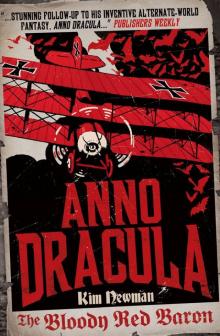 The Bloody Red Baron
The Bloody Red Baron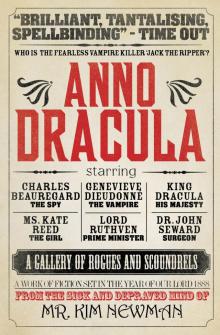 Anno Dracula
Anno Dracula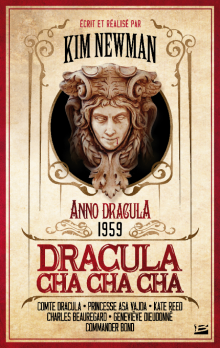 Dracula Cha Cha Cha
Dracula Cha Cha Cha Anno Dracula 1999
Anno Dracula 1999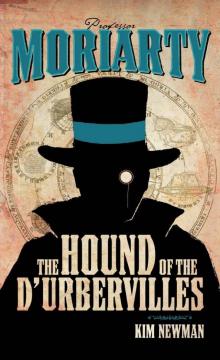 Moriarty: The Hound of the D'Urbervilles
Moriarty: The Hound of the D'Urbervilles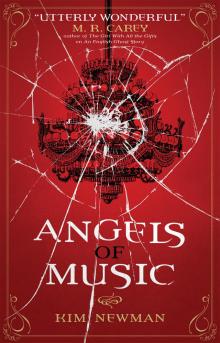 Angels of Music
Angels of Music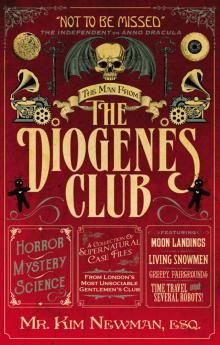 The Man From the Diogenes Club
The Man From the Diogenes Club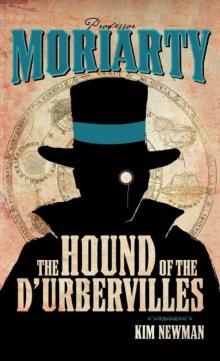 Professor Moriarty: The Hound Of The D’urbervilles
Professor Moriarty: The Hound Of The D’urbervilles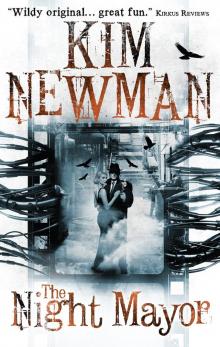 The Night Mayor
The Night Mayor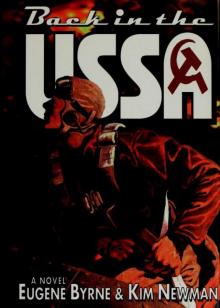 Back in the USSA
Back in the USSA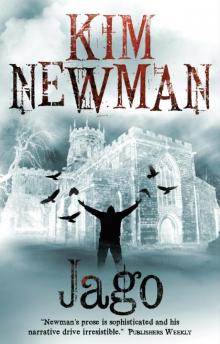 Jago
Jago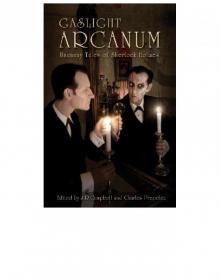 Gaslight Arcanum: Uncanny Tales of Sherlock Holmes
Gaslight Arcanum: Uncanny Tales of Sherlock Holmes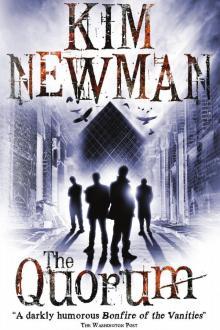 The Quorum
The Quorum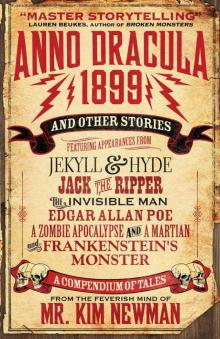 Anno Dracula 1899 and Other Stories
Anno Dracula 1899 and Other Stories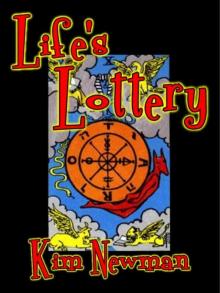 Life's Lottery
Life's Lottery The Secrets of Drearcliff Grange School
The Secrets of Drearcliff Grange School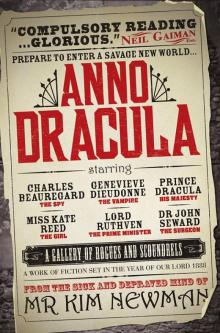 Anno Dracula ad-1
Anno Dracula ad-1 The Bloody Red Baron: 1918 ad-2
The Bloody Red Baron: 1918 ad-2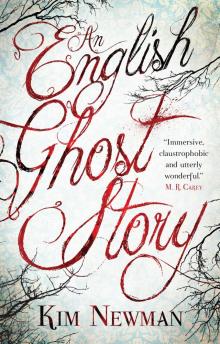 An English Ghost Story
An English Ghost Story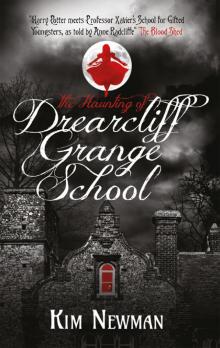 The Haunting of Drearcliff Grange School
The Haunting of Drearcliff Grange School The Other Side of Midnight
The Other Side of Midnight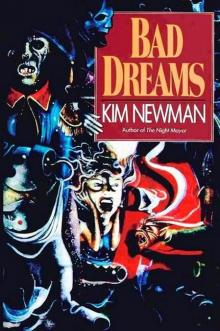 Bad Dreams
Bad Dreams Anno Dracula--One Thousand Monsters
Anno Dracula--One Thousand Monsters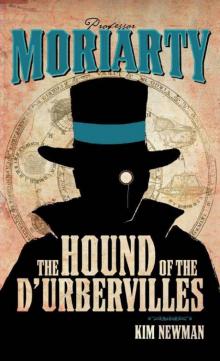 The Hound Of The D’urbervilles
The Hound Of The D’urbervilles The Bloody Red Baron: Anno Dracula 1918
The Bloody Red Baron: Anno Dracula 1918